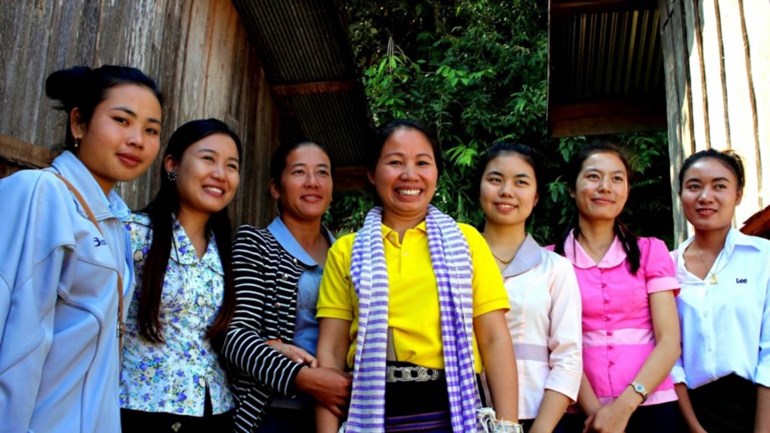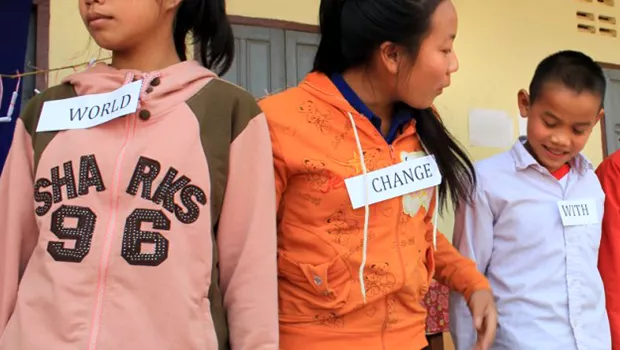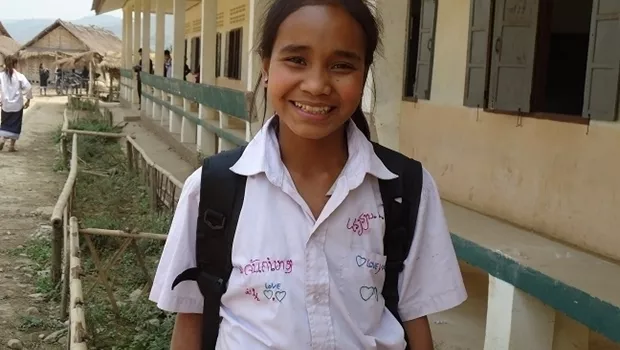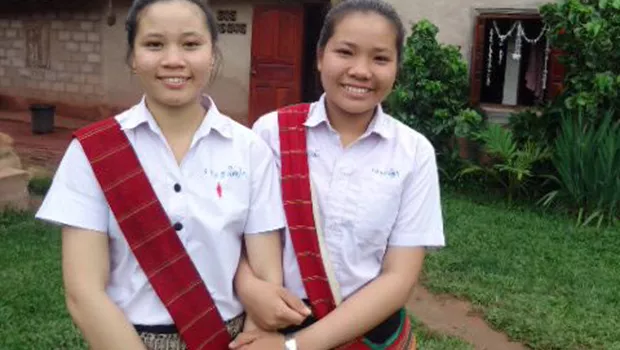Guest blog by Shelly Dee. Shelly leads the Room to Read Chapter in Singapore and recently joined the Chapter Leaders’ Trek in Laos where she had the opportunity to see our work and meet staff members like Bounyang.
Bounyang Sithinarongsy, the Laos Girls’ Education Program Manager, brings incredible professional expertise to the job, but she also brings a passion for her work that is borne out of her own battle to get an education as a child. During the Chapter Leaders’ Trek in October, 2014, the 16 of us travelling to Laos had the opportunity to see Bounyang in action and learn her story.
Although Bounyang’s salary is not exorbitant, she manages to support 10 family members in addition to supporting the education of her 11 nieces and nephews. Bounyang is the only member of the family to have finished high school, let alone university. She lives in Vientiane, Laos, 15 hours away by bus from her extended family.
Her family was very poor. Her father died when she was 4 years old. Besides caring for younger siblings, collecting water and firewood, pounding rice, and finding food, Bounyang, along with her mother and her five brothers and sisters, had to work in the rice fields for money. She describes the challenges of her childhood:
“At four years old, I had to get up early in the morning and walk to the rice field for rice planting before sunrise and come back after sunset. I walked back to our village from the rice field in darkness, heavy storms, lightning and thunder. We normally did not have rain coats. I was so cold, but we had to continue walking…”
Later, her older sister died of cancer and her older brother moved away to find work. Bounyang was left to not only take care of her younger brothers, but also to work even harder in the rice fields to feed everyone and pay for schooling.
Bounyang went to primary school older than most children. Rather than drop out like her sisters, she continued her grade 4 and grade 5 in another village 10 km away. She had to walk both ways every day with no road access, going through rice fields, bushes and over a small river. At school, the kids were mean to her because she was from another village and a different ethnicity.
After grade 5, she was determined to continue at the lower secondary school, which was closer but the school was located in a cemetery with no water and no toilet. She often felt unsafe as she passed men in the forest alone. All the other kids went home for the 2 hours lunch break but she couldn’t because of the distance. She was so afraid to be there by herself that most days she ran 4 km back to the rice field, ate quickly, and run back in the hot sun for afternoon class.
After school and on weekends, Bounyang continued to work in the rice field. She started working harder and harder so she could finish sooner to study. She recalled the day she was working so hard that she even pushed her “treasured friendly” water buffalo too far. “You go buffalo, go, go, go, and don’t be lazy” she continuosly prodded the buffalo until it stopped, angry, glaring at her with its big eyes. She was suddenly aware it could kill her with its long horns. In addition to this danger, working in the fertilized mud for the two months of rice prepping and planting made her hands and legs diseased, painful and itchy.
Every harvest season, her mother asked her to quit school. It was hard for her mother and sister, without her, to finish the harvest in time before the rice went bad. Bounyang kept promising her mother that she would quit just after finishing the next term. She said the same thing term after term.
After harvest, festivals are organized in villages. Bounyang and her mother didn’t go to enjoy themselves; they went to sell food and drinks, carrying them to the nearby villages to sell during the night and then walking back in the early morning.
At one point her teacher embarrassed her by telling the other students that she was a bad example, a “night girl.” She was so shy, crying inside, but could not explain. But even the gossip from the other students couldn’t make her drop out.
Fortunately, upper secondary school was closer and safer. She was a very good student and wanted to go on to university. But before the big university entrance exam, instead of getting tutoring and attending study sessions like her friends, she had to work in the fields. It was the only livelihood for her family. She had just one day to study. After the exams, she had no way of knowing the results. They only displayed them in the town 70km away! No mailings. No Internet. How could she know if she’d passed?
Luckily, a friend’s family member was going to town to check for another student–and he saw Bounyang’s name! She had passed and gotten a government scholarship. Bounyang managed to get to the town to register without telling her mother, who surely would not agree with her decision to continue her education. She was going to university!
The story has a happy ending. Bounyang double majored in English and Business Administration and then won an AusAID scholarship to Brisbane, Australia, to get a TAFE in Community Welfare. Since then, she has been working in the non-profit world and is now a senior staff member of Room to Read Laos.
When Bounyang speaks with her staff, who are all Social Mobilizers (the young women who manage the Girls Education Program at the village level and mentor other girls who are struggling to get an education), she sees girls just like herself who are tearing down barriers and seizing opportunities. Bounyang is more than a boss to these women; she is their inspiration.

Bounyang with her staff of social mobilizers.
She was also a huge inspiration to us, the Chapter Leaders that met her on this trip. She reminded us that even when the challenges seem insurmountable, the promise of a better future through education can still be realized. And, with the help Room to Read, that future is becoming more accessible to children in places like Laos and around the globe.
Learn more about our work in Laos and about how to visit our work.




